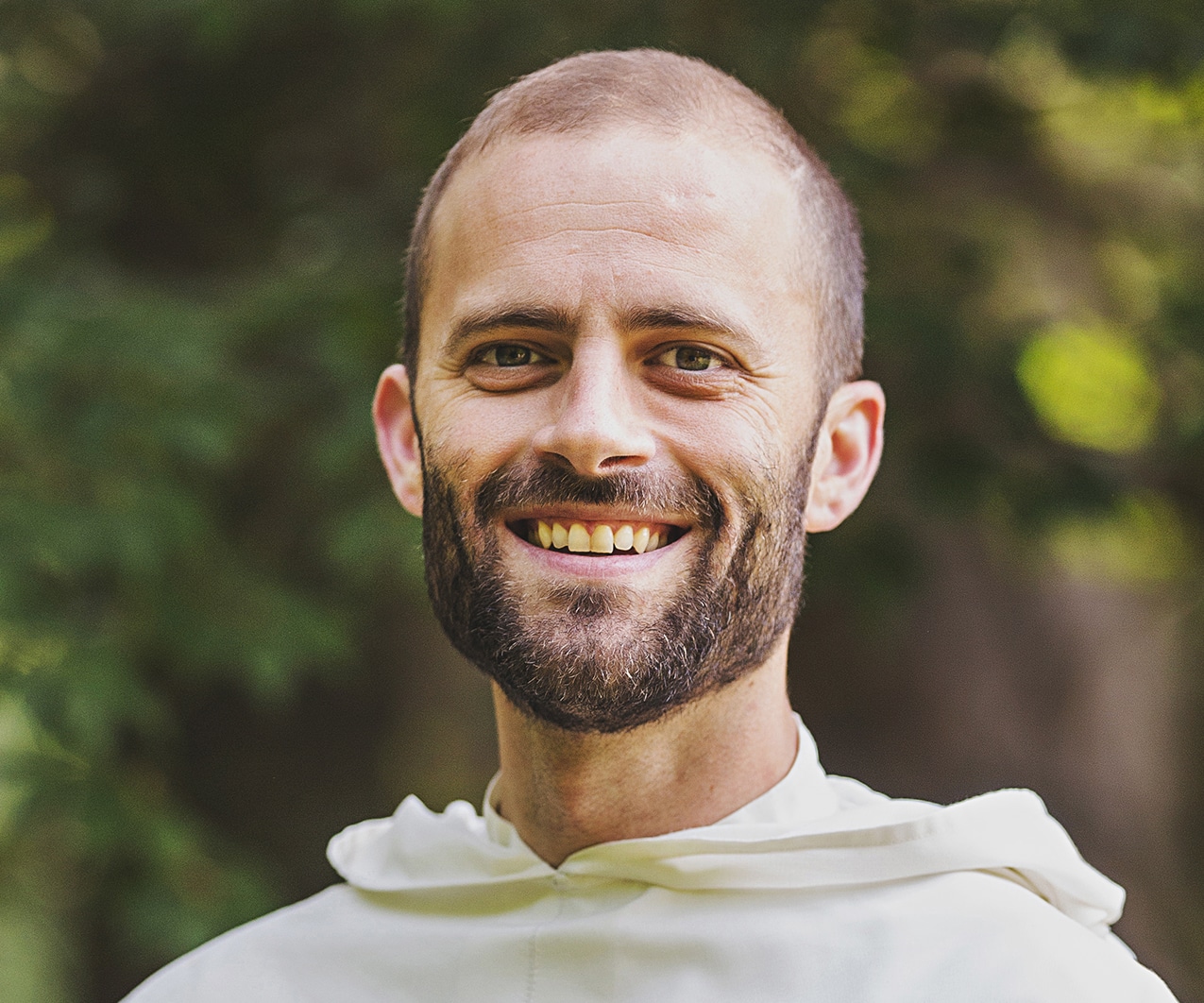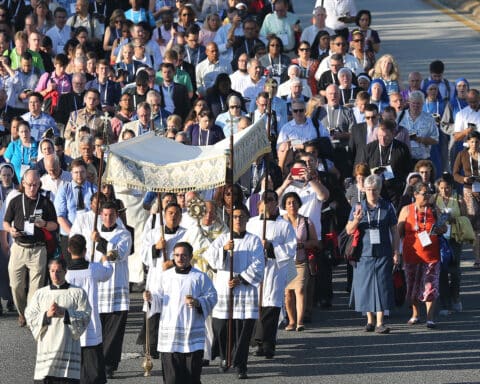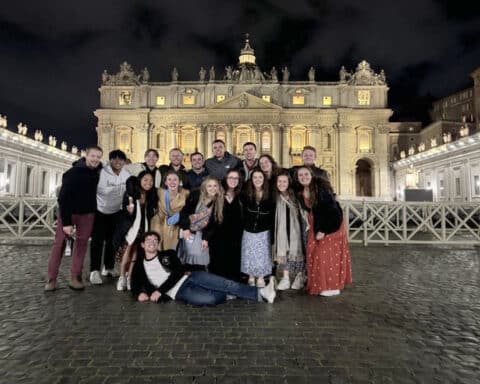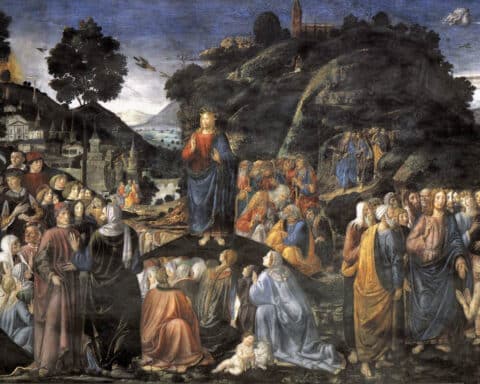My Dominican brother, Father Gregory Pine, is a powerhouse preacher, a towering intellect (he’s actually tall, too!) and a faithful man of prayer. He recently completed his doctorate in Christology at the University of Fribourg, in Switzerland, and was assigned to Washington, D.C., where he serves as assistant director of the Thomistic Institute. (He’s also written a fantastic book on the virtue of Prudence, published by OSV and available for purchase at the OSV Catholic Bookstore.)
This Saturday, the day before Dominicans observe Rosary Sunday, he’ll be preaching two conferences at the Basilica of the National Shrine as part of the first national Dominican Rosary Pilgrimage. This day-long gathering is graciously hosted by the Dominican Friars of the Province of St. Joseph, along with local charters of the Confraternity of the Most Holy Rosary, Dominican Friars, Dominican Sisters.
Our Sunday Visitor readers will be able to participate in the pilgrimage online, as the entire day will be live-streamed.
Ahead of Saturday’s exciting event, Father Pine sat down with Our Sunday Visitor to share a few thoughts on the Rosary.
Our Sunday Visitor: Father Gregory, can you share with us a personal story or experience that highlights the significance of the Rosary in your vocation?
Father Pine: In Christian life, there’s a certain temptation to think that our life only matters insofar as it’s sensational. But truth be told, while it is great to hear of extraordinary graces in the lives of the saints or in the lives of significant converts, the ordinary graces are the bread and butter of Christian conversion. For me, the ordinary grace mediated by the Rosary was the grace of constancy. I saw it especially in my father, that his love for the Lord, for the Blessed Virgin Mary, was a gift that he gave to our family in praying the Rosary. And it’s something that that took in each of our lives, and that my sisters continue to give to their families and my brother to his young family and in my own life in the Dominican Order. I think the grace of a kind of simple constancy in the life of my father and my mother translated to our own love of the Blessed Virgin Mary and her Rosary.
Our Sunday Visitor: Many people experience the Rosary as a repetitive and monotonous prayer; can you speak to the beauty and depth found in this seemingly simple devotion?
Father Pine: I was reading Fulton Sheen’s book, “The World’s First Love,” and in it he talks about a woman who came up to him with an objection about the Rosary, saying it’s repetitive. It can’t possibly be real.
Archbishop Sheen asks her who the gentleman is next to her. She replies, “He’s my fiancé.” And Sheen asks, “Does he love you?” She says yes. He asks, “How do you know that he loves you?” She’s replies, “Because he told me.” Sheen asks how recently? She said a couple of hours ago. Sheen asks, “Has he ever told you previously?” She says yes. Sheen asked if he had ever told her this before then. She says yes: “He has told me he loves me, every day for the past three months.” And then Sheen responded and said: “It can’t possibly be true. It’s too repetitive.”
I think the simple things of human life are all repetitive because human life isn’t terribly complex or complicated. It’s hard. It’s difficult. But it’s the type of thing that we undertake to do with greater grace each day. And the Rosary is one of those repetitive things that accompanies us through the repetition of life.
Our Sunday Visitor: Many of us live and die by distractions today on social media or otherwise. How can individuals find the time and focus to incorporate the Rosary into their daily lives?
Father Pine: It depends. Some people enjoy praying the Rosary while seated, some while kneeling, others while whatever. Posture or the type of setting will sometimes be a help to you in praying the Rosary. But for other people, that same method might be an occasion for falling asleep or entertaining further distraction. So you might find it better to walk and pray the Rosary or to look at sacred art and pray the Rosary.
Distractions are part of human life, and they’re not the last word. St. Teresa of Ávila says distractions crop up. You kind of notice that they’re there, and then you watch them pass you by. You don’t have to get all stirred up because they arise with terrible frequency, because that would be to disquiet the peace of your heart which the Lord seeks to cultivate. So they’re going to come. No big deal.
Our Sunday Visitor: Are there any lesser-known aspects or hidden treasures of the Rosary that you would like to highlight for those who might be less familiar with it?
Father Pine: This might be a controversial thing. I would highlight its simplicity, right? Just pray five decades. If you say some prayers beforehand, great. If you say some prayers afterward, great. But like, you don’t have to. And I would even suggest it might be better not to, because if the Rosary becomes a big thing, we might be less likely to pray it. I think it’s important that you pray it and let it be a nice little 13 to 15 minute prayer. It’s wonderful for a commuter. It’s very wonderful for a break. It’s very wonderful as an occasion for recollection. But I would say don’t overburden it, thinking that you are getting more out of it by improving it.
Our Sunday Visitor: Finally, as we reflect on the various mysteries of the Rosary, what insights can we draw from this prayer that help us navigate the challenges of modern life and grow in our devotion?
Father Pine: The Rosary is about adopting a contemplative stance before the mysteries of our Lord Jesus Christ in union with the Blessed Virgin Mary. And guess what? Human life is about adopting a contemplative stance before the mysteries of our Lord Jesus Christ in union with the Blessed Virgin Mary. A contemplative stance is about receiving what life gives us again, with grace, not rebelling against it, not kind of melting into a puddle of despair before it, but undertaking to live it, because real life is here before the mysteries of our Lord Jesus Christ.
Our Lord addresses salvation to us in living our life, and each of those mysteries is charged with grace, which is for us. But we have to gaze on them. We have to profit from them. We have to receive them. We have to have them applied to our lives.
The Rosary helps in that effort and in union with the Blessed Virgin Mary who was afforded the grace highest among all those who are not God. And because to be the mother of God is to be as close to God as one can be, not merely because she bore him in her womb, but because she bore him in her heart. To look on the Lord through the eyes of the Blessed Virgin Mary is to do so with the keenest gaze. It’s to do so with the most loving gaze.
It helps us to live our Christian lives, and we need all the help we can get.





